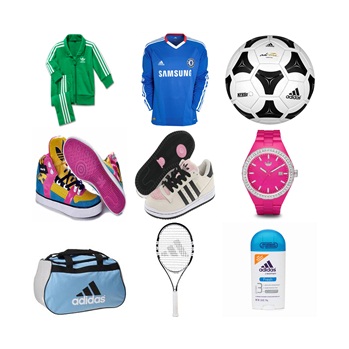Description of Products
Adidas AG is a German sports apparel manufacturer and parent company of the Adidas Group, which consists of the Reebok sportswear company, TaylorMade- adidas golf company (including Ashworth), and Rockport. Besides sports footwear, the company also produces other products such as bags, shirts, watches, eyewear, and other sports- and clothing-related goods. The company is the largest sportswear manufacturer in Europe and the second-biggest sportswear manufacturer in the world, with American rival Nike being the biggest.
Profile of Entrepreneur
| Name | Adolf "Adi" Dassler |
| Born | 3 November 1900 |
| Birth Place | Herzogenaurach, Bavaria, Germany |
| Died | 6 September 1978 |
| Cause of death | Heart Failure |
| Nationality | Germany |
| Parents | Christoph Dassler(father) Paulina Dassler(mother) |
Logo of Adidas
Adidas logo was created by Adi Dassler (founder of Adidas). History of the Adidas logo started in 1972.
New logo was represented in 1994.
Pictures of Product
How the Business Started
- Trained as a cobbler, Adi Dassler started to produce his own sports shoes in his mother's laundry after his return from World War I. His father, Christoph, who worked in a shoe factory, and the Zehlein brothers, who produced the handmade spikes for track shoes in their blacksmith's shop, supported Dassler in starting his own business.
- On July 1, 1924, his older brother Rudolf Dassler joined the business, which became the Gebrüder Dassler Schuhfabrik (Dassler Brothers Shoe Factory).
- At the 1928 Olympics, Dassler equipped several athletes, laying the foundation for the international expansion of the company. During the 1936 Summer Olympics in Berlin, Dassler equipped Jesse Owens of the USA with his shoes. Jesse Owens won 4 gold medals in the year he wore Adi's shoes.
- With the rise of Adolf Hitler in the 1930s, both Dassler brothers joined the Nazi Party, with Rudolf reputed as being the more ardent National Socialist. Rudolf was drafted, and later captured, while Adi stayed behind to produce boots for the Wehrmacht.The war exacerbated the differences between the brothers and their wives. Rudolf, upon his capture by American troops, was suspected of being a member of the SS, information supposedly supplied by none other than his brother Adi.
- By 1948, the rift between the brothers widened. Rudolf left the company to found Puma on the other side of town (across the Aurach River), and Adolf Dassler renamed the company Adidas.
- In 1973, Adolf Dassler's son Horst Dassler founded Arena, a producer of swimming equipment. After Adolf Dassler's death in 1978, Horst and his wife Käthe took over the management. Horst died nine years later, in 1987. Adidas was transformed into a private limited company in 1989, but remained family property until its IPO in 1995.
How the Product Got Its Name
- Adolf Dassler renamed the company Adidas after his own nickname which is 'Adi' from Adolf and 'Das' from Dassler.
- "Impossible is Nothing" is the current mainstream marketing slogan for Adidas
Unique Features That Makes It an Outstanding Product.
- Adidas will performance brand and multi-sport specialist .
- Adidas’ mission is to be the leading sports brand in the world. One major lever to achieve this is the brand’s broad and unique product portfolio spanning from apparel and footwear for professional athletes to premium fashion.
- It allows Adidas to address multiple consumer needs, exploit market opportunities from various angles as well as be less affected by one-dimensional market risks.
- Adidas commitment to product innovation and its rich heritage differentiates the brand from competitors and provides a solid platform for future growth.
Key Factors contributing to the success of the business.
- Brand awareness always brings a considerable advantage in getting consumer's attention and making a good place in that shoe market.
- If a well established brand name effectively mentions the messages of quality and dependability. Thus consumers will automatically go to that brand relying on the image that has been created when they don't have time to shop around.
- Adidas, like other sports brands, is believed to engender high consumer brand loyalty. Brand loyalty towards Adidas, Nike, Inc., Puma AG and several other sportswear brands was examined in a recent study. The study found consumers did not exhibit unduly high loyalty towards such brands.
- During the mid to late 1990s, Adidas divided the brand into three main groups with each a separate focus: Adidas Performance was designed to maintain their devotion to the athlete; Adidas Originals was designed to focus on fashion and life-style; and Style Essentials, with the main group within this one being Y-3.
Achievements Attained
2011 - Adidas AG included in Dow Jones Sustainability Indexes for 12th time
2011 - Continued inclusion in the FTSE4Good Index
2011 - Adidas AG included in the STOXX® Global ESG Leaders indices
Silver medal for Adidas AG as "Sustainable Retail Company 2011"
2011 - Adidas Group selected as one of the world's most ethical companies
Inclusion in the Vigeo Group Indexes
Inclusion in the ECPI Ethical Index EMU
Adidas Group among the 100 most sustainable corporations in the world
Best rating by European consumer organizations in 2009
Re-accreditation by the Fair Labor Association in 2008
B.A.U.M. Environmental Award 2007
Product rated best for quality and CSR by Stiftung Warentest in 2006
Adidas Group among Top Employers of the Year 2006
Best Sustainability Reporting for 2002 and 2004




